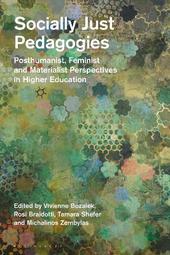
|
Socially Just Pedagogies: Posthumanist, Feminist and Materialist Perspectives in Higher Education
Paperback / softback
Main Details
| Title |
Socially Just Pedagogies: Posthumanist, Feminist and Materialist Perspectives in Higher Education
|
| Authors and Contributors |
Edited by Professor Rosi Braidotti
|
|
Edited by Vivienne Bozalek
|
|
Edited by Tamara Shefer
|
|
Edited by Michalinos Zembylas
|
| Physical Properties |
| Format:Paperback / softback | | Pages:264 | | Dimensions(mm): Height 234,Width 156 |
|
| Category/Genre | Ethics and moral philosophy
Social and political philosophy |
|---|
| ISBN/Barcode |
9781350143807
|
| Classifications | Dewey:306.432 |
|---|
| Audience | | Tertiary Education (US: College) | |
|---|
|
Publishing Details |
| Publisher |
Bloomsbury Publishing PLC
|
| Imprint |
Bloomsbury Academic
|
| Publication Date |
26 December 2019 |
| Publication Country |
United Kingdom
|
Description
This book addresses contemporary philosophical issues in higher education and how we can create socially just pedagogies and a socially just university. Providing a forum for thinking through how critical posthumanism, affect theory and feminist new materialisms provide a useful lens for higher education, and shows how these standpoints can benefit methods and practices of learning and teaching. Gross inequalities in higher education continue to affect pedagogical practices across geopolitical contexts and there is a need to consider new theories which call into question the commonplace humanist assumptions currently dominating the discourse around social justice in this context. However scholarship on the affective turn, critical posthumanism and new material feminisms, opens both new possibilities and responsibilities for higher education pedagogies. The approaches of this book also provide imaginative ways of engaging with current dissatisfactions with higher education, from the marketization of education, to issues of racism, discrimination and lack of diversity. Of international relevance, this collection particularly foreground southern contexts and case studies, such as the student activism in South African universities that has sparked a global project of decolonization and social justice in educational institutions. This book is an urgent call to reconceptualize, rethink and reconfigure pedagogies in higher education and the implications for future citizenship and social participation.
Author Biography
Vivienne Bozalek is Professor of Social Work and the Director of Teaching and Learning at the University of the Western Cape, South Africa. Rosi Braidotti is Distinguished University Professor and founding Director of the Centre for the Humanities at Utrecht University, The Netherlands. Tamara Shefer is Professor of Women's and Gender Studies and currently Deputy Dean of Teaching and Learning in the Faculty of Arts at the University of the Western Cape, South Africa. Michalinos Zembylas is Professor of Educational Theory and Curriculum Studies at the Open University of Cyprus.
ReviewsContinuing the most exciting and challenging histories of engaged feminist thought, the chapters in Socially Just Pedagogies grapple with the lived histories of inequality-structured by race, gender, sexuality, coloniality, and age-and use specific sites of educational struggle as occasions to test and transform the ways we understand materiality, subjectivity, and most importantly the social. Without ever losing touch with the intra-human violences that structure global relations, the authors forcefully re-imagine pedagogy as always more-than-human. This incredible book makes the case that feminist education is constitutively materialist and nonhumanist, and that new materialist politics are inescapably pedagogical. -- Nathan Snaza, Director, Bridge to Success Program, Department of English, University of Richmond, USA A strong case for the theoretical input of posthuman and affect theory, this is new to the field of educational studies and is much needed. The authors have produced a fine piece of work. This should be a big player in the critical educational literature. -- Dan Goodley, Professor of Disability Studies and Education, University of Sheffield, UK It's about time we had a book like this, that tackles education's unswerving adherence to outdated 20th century humanist premises. The most apparent strength is the editors' (and contributors') strong grasp on the posthumanist, affective and new materialist theoretical perspectives that frame this collection. The emphasis on southern perspectives is very refreshing and will make a unique contribution to the broader posthumanist educational field, which is dominated by global north theorists and research. Particularly interesting because it also documents the recent student activism in South African universities, these challenges to the humanist norms of educational practice are overdue. This book is one of the first ones to make the challenges - others will follow.' -- Affrica Taylor, Associate Professor of Geographies of Education and Childhood, University of Canberra, Australia
|